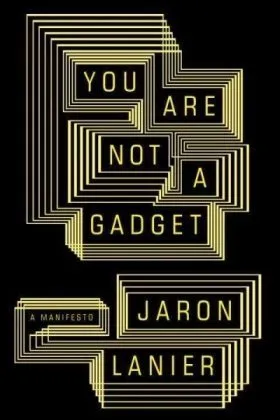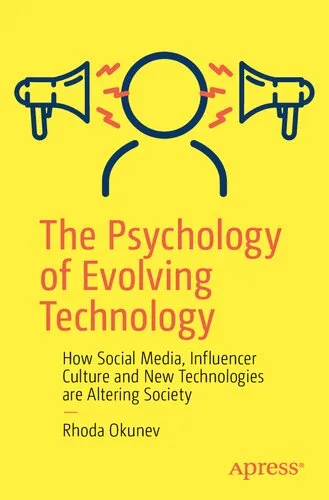You Are Not a Gadget: A Manifesto
4.1
بر اساس نظر کاربران

شما میتونید سوالاتتون در باره کتاب رو از هوش مصنوعیش بعد از ورود بپرسید
هر دانلود یا پرسش از هوش مصنوعی 2 امتیاز لازم دارد، برای بدست آوردن امتیاز رایگان، به صفحه ی راهنمای امتیازات سر بزنید و یک سری کار ارزشمند انجام بدینکتاب های مرتبط:
معرفی کتاب "تو یک گجت نیستی: یک مانیفست"
کتاب "تو یک گجت نیستی: یک مانیفست" اثری از جارون لنیر است که توجه خود را معطوف به بررسی انتقادی فناوریهای دیجیتال و تأثیرات گسترده آنها بر جامعه، هویت انسانی و خلاقیت کرده است. این کتاب که در ابتدا سال ۲۰۱۰ منتشر شد، یک بیانیه قدرتمند در مورد خطرات بالقوه تکنولوژیهایی مانند Web 2.0، طراحی غلط سیستمهای دیجیتال و کاهش ارزش انسانیت است. لنیر در این اثر بهگونهای بدیع، ماهیت فناوری و استفاده نادرست از آن را نقد میکند و از ما میخواهد به جای قربانی شدن در مقابل الگوریتمها و رسانهها، تفکر انتقادی داشته باشیم و ارزش انسانی خود را احیا کنیم.
خلاصهای از کتاب
در "تو یک گجت نیستی"، لنیر اینچنین استدلال میکند که ابزارهای دیجیتال که هدفشان سادهسازی و آسان کردن زندگی انسانهاست، میتوانند اثرات منفی بزرگی داشته باشند. او نگرانی ویژهای درباره تأثیر مدلهای کسبوکار مربوط به Web 2.0 و سیستمهای مبتنی بر crowd-sourcing (تأمین اطلاعات جمعی) دارد، چرا که این مدلها خلاقیت را سرکوب و انسانها را به دادههای قابل پیشبینی بدل میکنند. لنیر معتقد است که طراحی رسانهها و سرویسهای دیجیتال باید در راستای تقویت خلاقیت و فردیت باشد، نه برعکس.
این کتاب نگاهی تیزبینانه به نوآوریهای تکنولوژیکی دارد، مانند Social Media platforms، که اغلب به جای ایجاد فضایی برای ارتباطات عمیق انسانی، بیشتر ابزارهایی برای جمعآوری دادهها و کنترل رفتار کاربران شدهاند. لنیر همچنین تأکید میکند که با پذیرش یک نگرش انتقادی، میتوان از ابزارهای تکنولوژی به شکلی هوشمندانه و اخلاقیتر استفاده کرد.
نکات کلیدی از کتاب
- انتقاد از Web 2.0: لنیر بیان میکند که اینترنت از یک ابزار خلاقانه به یک فضای محدودکننده تبدیل شده است.
- اهمیت فردیت: در دنیای دیجیتال امروز، ارزش منحصر به فرد بشر نباید نادیده گرفته شود.
- خلاقیت و ارتباط انسانی: فناوری نباید خلاقیت و ارتباطات عمیق انسانی را کاهش دهد.
- پرهیز از شیءانگاری: لنیر هشدار میدهد که نباید خود را تنها در قالب دادهها و ابزارها تعریف کنیم.
- اخلاق در طراحی فناوری: طراحی سیستمها باید بر اساس ارزشهای انسانی باشد.
جملات معروف از کتاب
"انسانها همیشه از فناوری استفاده کردهاند، اما ما نباید ابزارهایی را خلق کنیم که در نهایت ما را کنترل کنند."
"هر چه بیشتر خود را به الگوریتمها بسپاریم، کمتر شبیه به انسان و بیشتر شبیه به گجت خواهیم شد."
چرا این کتاب مهم است؟
"تو یک گجت نیستی" یک هشدار جدی درباره مسیری است که در آن انسانها ممکن است ارزش انسانی خود را قربانی روندهای دیجیتالی کنند. این کتاب به ما یادآوری میکند که فناوری باید برای ما کار کند، نه برعکس. لنیر با پشتوانه دانش گسترده خود درباره علوم کامپیوتر و تجربهاش در عصر دیجیتال، صدایی قدرتمند برای توقف و بازاندیشی درباره فناوری ارائه میدهد.
این کتاب به خصوص برای کسانی که در صنعت فناوری، طراحی محصول یا مطالعات اجتماعی فعالیت دارند، اهمیت زیادی دارد، زیرا مبانی اخلاقی طراحی و استفاده از فناوریهای مدرن را زیر سوال میبرد.
Introduction to "You Are Not a Gadget: A Manifesto"
Written by visionary thinker Jaron Lanier, You Are Not a Gadget: A Manifesto challenges our contemporary relationship with technology, societal structures it influences, and the often-overlooked implications of digital culture. Offering an incisive critique of the internet’s design and how it shapes human interaction, Lanier provides a foundational discussion on reclaiming individuality in an increasingly homogenized digital age.
Detailed Summary of the Book
At its core, You Are Not a Gadget examines how the design and structure of the internet affect societal values, creativity, and personal freedom. Lanier argues that many aspects of digital culture have unintentionally commodified human intelligence, stripping away the richness of individuality in favor of crowdsourcing and collective thinking.
Lanier delves into the origins of current digital systems, like social media platforms and open-source principles, critiquing how these developments have boxed humanity into limiting digital templates. He explores how the "hive mind" mentality, celebrated in some circles, often suppresses true innovation and individuality, reducing people to mere extensions or tools of larger algorithms and systems.
Further, Lanier critiques phenomena like file sharing and the rise of Web 2.0. He notes how these trends promote homogeneous content over deeper, original works and how platform monetization exploits user participation under the guise of "free access." Rather than empowering individuals, these models often enrich a select few at the expense of creators and communities. In his manifesto, Lanier warns of the dangers of this trajectory but also provides hope and guidance for resurrecting the human spirit in tech-driven environments.
Key Takeaways
- The current architecture of the internet encourages conformity, rather than amplifying individuality.
- Social media and similar systems commodify human experiences, reducing people to mere data points.
- Crowdsourcing and openness, while revolutionary in concept, often lead to lower quality creations due to lack of personal accountability.
- Creative individuals are marginalized in digital ecosystems, with large financial benefits flowing to tech infrastructures instead of creators.
- Humanity's future depends on redesigning technology to serve individual values, creativity, and freedom.
Famous Quotes from the Book
"If we start believing in the technology more than the people, it stops serving us and starts controlling us."
"Information doesn’t deserve to be free. It is an imaginary entity that can only exist because people believe in it."
"You have to be somebody before you can share yourself."
Why This Book Matters
In a world increasingly dominated by automation, artificial intelligence, and digital platforms, Jaron Lanier’s You Are Not a Gadget is not just another critique of technology—it is a call for re-evaluation and reform. The book reminds us of the irreplaceable qualities of human creativity, individuality, and emotional depth. By questioning the frameworks we take for granted, Lanier encourages readers to consider whether modern technologies reflect the kind of society we want to build and inhabit. Thought-provoking and deeply relevant, the manifesto underscores the importance of designing tools that serve humanity rather than subjugate it.
This book is essential reading for anyone who wants to navigate the digital age consciously—be it technologists, artists, entrepreneurs, or everyday users. Lanier’s insights are as much a critique of digital culture as they are a hopeful roadmap for a more humane future, making his work a rallying point for reclaiming personal agency in the face of technology’s rapid evolution.
دانلود رایگان مستقیم
You Can Download this book after Login
دسترسی به کتابها از طریق پلتفرمهای قانونی و کتابخانههای عمومی نه تنها از حقوق نویسندگان و ناشران حمایت میکند، بلکه به پایداری فرهنگ کتابخوانی نیز کمک میرساند. پیش از دانلود، لحظهای به بررسی این گزینهها فکر کنید.
این کتاب رو در پلتفرم های دیگه ببینید
WorldCat به شما کمک میکنه تا کتاب ها رو در کتابخانه های سراسر دنیا پیدا کنید
امتیازها، نظرات تخصصی و صحبت ها درباره کتاب را در Goodreads ببینید
کتابهای کمیاب یا دست دوم را در AbeBooks پیدا کنید و بخرید



